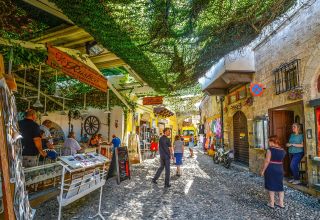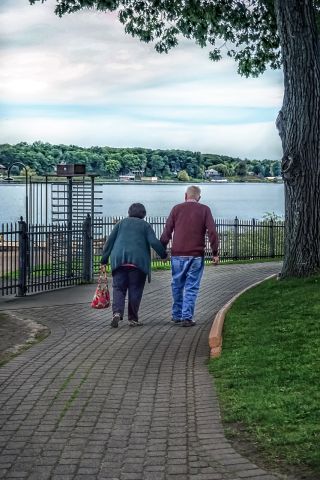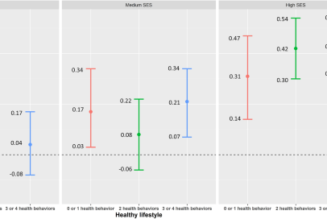A year ago, I planned a vacation with a childhood friend. Since we were both over 60, we thought we would visit an area where there were many centenarians. We hoped to be inspired by the healthy living approaches in such an area and to learn more about how to age well.

Ikaria, a Greek island in the Northern Aegean Islands, checked many of our boxes — pleasant climate, beautiful views, and a large percentage of seniors living healthful long lives. Ikaria is one of the regions in the world with the largest per capita group of citizens over the age of 90.
Researchers report that senior inhabitants of this island paradise have exceptionally long lives due to the combination of the following healthy living habits: staying active throughout each day; eating a plant-based and/or Mediterranean diet; and creating and maintaining social connections. Longevity occurs among residents even though they have other risks for cardiovascular disease, such as diabetes.
The island residents regularly stay active by doing housework and gardening, and also by walking over hilly routes to visit friends. Moving the body is a routine part of each day, as is meeting up with friends at the town square for wine, meals that include many vegetables like a local dish called soufico, and dominoes.
In a study on Ikarian super seniors, researchers found that social contact took place daily for 78% of the participants, and a large percentage took part regularly in religious activities. Even though access to formal primary healthcare was considered difficult for 66% of the respondents, they maintained reasonably good health after age 90.
My friend and I stayed on the island for only four days (so our trip likely did not affect our lifespan), but we did get a sense of a lifestyle approach that we could bring back to the States.
Daily Socialization and a Mediterranean Diet Contribute to Senior Longevity
As a result of the original longitudinal Framingham study, which looked at how risky health behaviors influence health, most of us know that avoiding smoking and adhering to low-cholesterol diets encourage longevity. But, in recent years, health researchers have moved from simply assessing these mainstream influences on biologic metrics such as blood pressure to assessing how psychosocial factors, such as having relationships and an optimistic temperament, affect well-being and ultimately health outcomes.
Attention to the relationship of social connections to overall health and longevity has become mainstream. Dr. Vivek Murthy, the current U.S. Surgeon General, has embraced a campaign to improve social relationships and is traversing the country on the “We are Made to Connect Tour,” focusing on coaching college students about how socialization helps stave off physical and mental illness. Hopefully, college students will come to understand that making and keeping connections improves their chances of aging healthily.
How do we Americans compare on social connectedness to citizens in other countries? Just recently, the World Health Organization created an international commission to combat loneliness, indicating that country leaders have an interest in assessing the psychosocial factors of their citizens.
An October 2023 conference on global well-being promoted research focusing on how social relationships are crucial for individual and population wellness. Gallup, one of the sponsors of the conference, has prioritized research related to social connectedness. The good news is that more than 70% of adults surveyed in dozens of countries felt connected, defined as “how close you feel to people emotionally.”
However, some countries’ participants noted low connectivity. The United Arab Emirates and the Republic of Congo were at the bottom in terms of connectivity. Mongolia had the highest level, with a record 95% of respondents indicating that they have strong social connectedness. About 78% of American respondents felt very or fairly connected.
While having a 78% connectivity rate may seem reasonable, there are wide variations in the U.S. Using a map devised by AARP and University of Chicago NORC, one can look for pockets of high socialization in the U.S. The tool helps compare measures of social isolation and link those measures to the other healthy (or non-healthy) living measures, such as excessive drinking or poor mental health.
For instance, certain areas of Nevada have a high percentage of citizens living alone who indicated that they do not socialize once a month. The map allows one to align that statistic with that of people reporting they have poor mental health. As expected, lack of socialization often aligns with reported poor mental health. In another study — The Jackson (Mississippi) Heart study — researchers concluded that high levels of social cohesion predicted longer lives.
How do we bring elements of the healthy socialization, healthy active living approach that promotes longevity seen in Ikaria and in other countries such as Okinawa, Japan to U.S. communities? The World Health Organization (WHO) has put forth a framework for environments conducive to healthy aging. WHO highlights the need for intergenerational socialization activities and activities in safe, senior-friendly, outdoor green spaces. They recommend promoting social inclusion to stave off isolation.

Communities should brainstorm about how to enhance regular senior socialization by improving the built environment so that natural movement occurs and so that seniors can easily gather with their friends and family. The idea that many of us could live above 90 and be happy, fit, and with friends is a goal for most of us — community leaders have a part to play in making changes to enhance the chances that many age gracefully. Promoting walkable communities where citizens can stroll to socialize is a first step, and from there longevity can be extended by plant-based eating habits; friends and family; and reasonable every-day movement.









